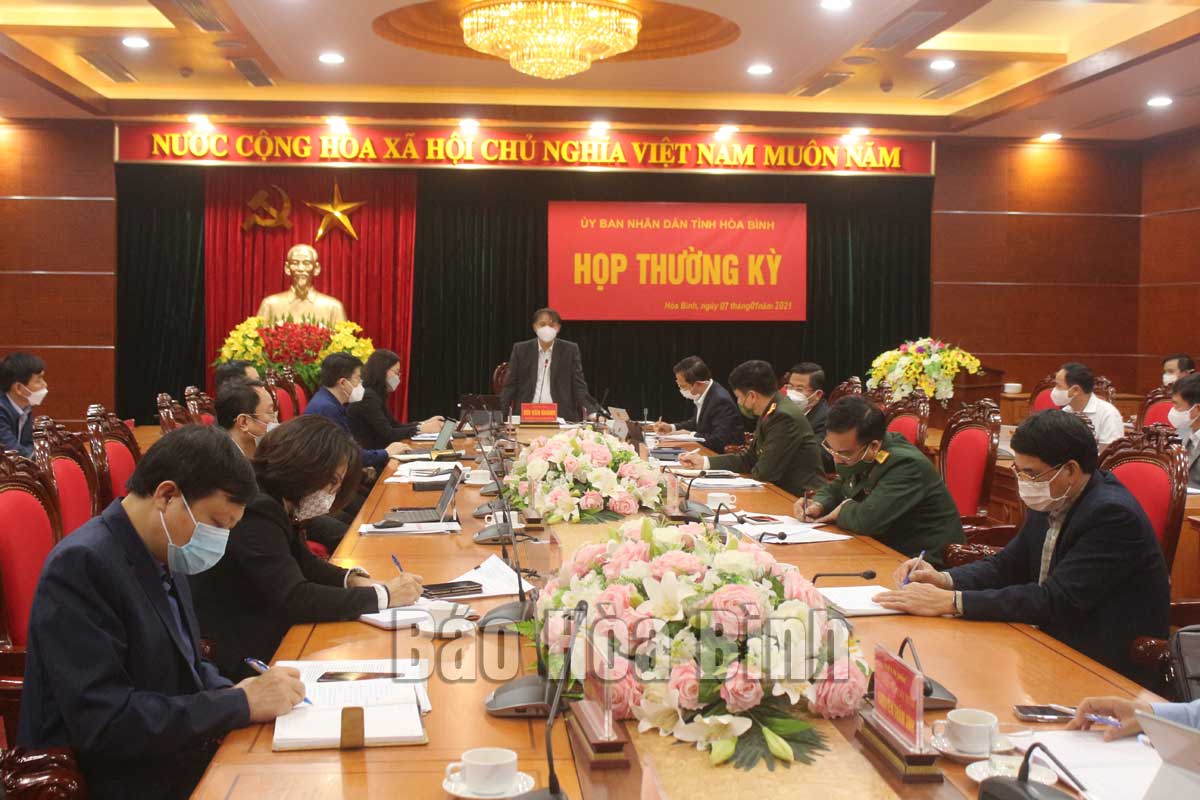
(HBO) – The Hoa Binh People’s Committee on January 7 organised a regular meeting to discuss the province’s socio-economic development and its governance. The meeting was chaired by Bui Van Khanh, Deputy Secretary of the provincial Party’s Committee and Chairman of the provincial People’s Committee.
Photo: Bui Van Khanh, Deputy Secretary of the provincial Party’s Committee and Chairman of the provincial People’s Committee, delivers a remark at the meeting.
According to reports delivered at the event, site clearance in a number of major projects lagged behind schedules set by the chairman of the provincial People’s Committee while many commercial housing projects saw slow progress. The pace of public investment disbursement also failed to meet expectation. By December 20, 2021, Hoa Binh had disbursed nearly 2.55 trillion VND, equivalent to 73 percent of the yearly plan set by the Prime Minister and 67 percent of that set by the People’s Committee.
In January 2022, the People’s Committee requested its units to strengthen supervision of public administration reforms, and progress and effectiveness of duty performances; and to accelerate public investment disbursement. The province aims to disburse 100 percent of the public investment by the end of this month.
Concluding the event, Chairman of the provincial People’s Committee Bui Van Khanh asked departments and local administrations to give the highest priority to public investment disbursement to fulfill the goal by the end of January.
They must also pay more attention to completing site clearance, particularly in key projects, he said, adding that specific deadlines must be assigned for each project to achieve highest results in order to boost the province’s socio-economic development.
As the province’s daily caseload of COVID-19 exceeds 100, including many community infections, Khanh ordered districts and communes to better raise public awareness of the importance of adherence to the pandemic rules. They must also keep records of unvaccinated residents so as to quickly increase the vaccination coverage, he stressed./.
Dao Village’s honey – a product certified with a 3-star OCOP (One Commune One Product) rating by Thong Nhat Agricultural Cooperative in Dao Village (Hoa Binh City) – is highly regarded by consumers for its quality, richness, and variety in packaging. The distinctively sweet taste of Dao Village’s honey leaves a lasting impression on anyone who has tried it.
In alignment with Project No. 07-DA/TU, issued by the Hoa Binh provincial Party Committee on November 1, 2021, Lac Thuy district has actively promoted investment and supported the sustainable development of its industrial and handicraft sectors during the 2021–2025 period. Alongside this, the district has remained committed to preserving and revitalising traditional craft villages.
Located in the northern part of Lac Thuy district, with a temperate climate and fertile soil, Phu Thanh commune has great potential and advantages in growing tea. The long-standing experience, combined with strict adherence to organic farming practices in the tea gardens, ensures that the dried tea products from Phu Thanh and Lac Thuy as a whole are sold out immediately upon production, providing a stable and prosperous life for the local people.
Amid efforts to streamline the administrative apparatus, Hoa Binh province has intensified measures to address challenges in land clearance, resettlement support, and infrastructure investment, aiming to speed up the progress of key projects.
Hoa Binh province has posted an unprecedented economic growth rate of 12.76% in the first quarter of 2025, marking its highest quarterly performance to date and positioning it as the second fastest-growing locality in the country, trailing only Bac Giang province.
Under current regulations, products in the One Commune – One Product (OCOP) programme that are rated three stars or higher must undergo re-evaluation every three months. However, in reality, some of these products fail to consistently meet the required standards, raising concerns about the sustainability of their OCOP certification. This underscores the urgent need for producers to enhance product quality and gradually develop their OCOP products into strong, marketable brands.



